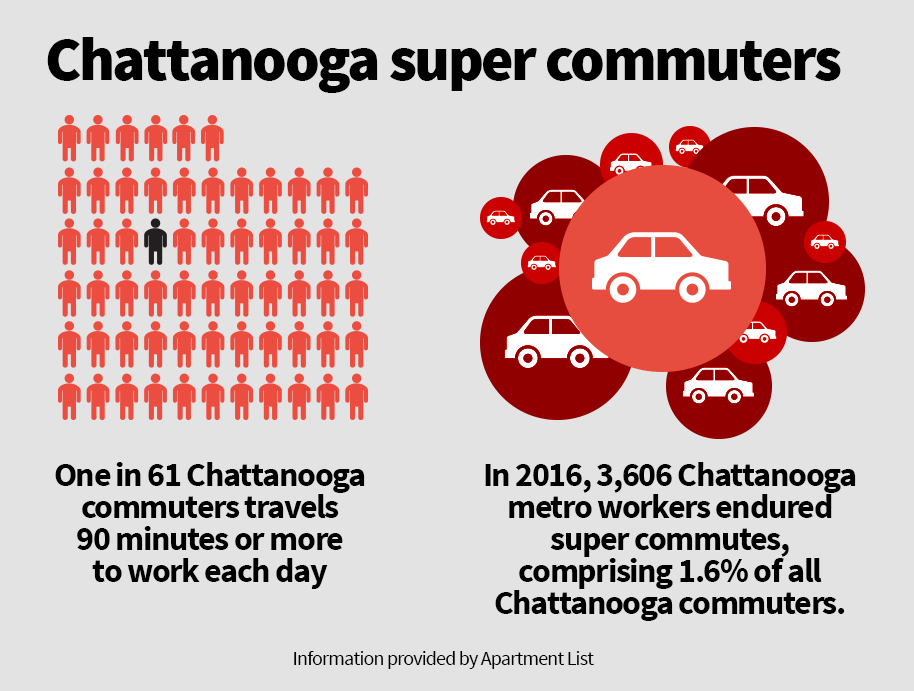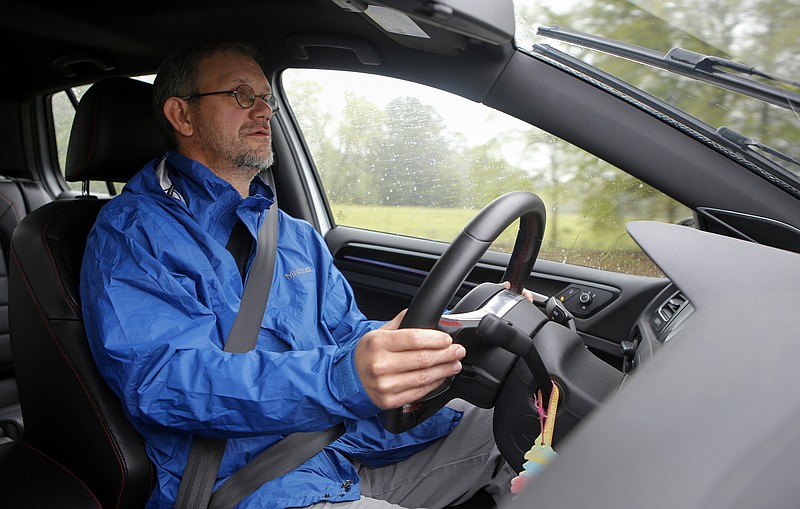‘Super commuters’ in the region, 2016:
1. Chattanooga, Tenn.: 3,606 or 1.6 percent2. Knoxville, Tenn.: 6,590 or 1.6 percent3. Nashville, Tenn.: 16,377 or 1.8 percent4. Memphis, Tenn.: 6,945 or 1.3 percent5. Atlanta, Ga.: 101,796 or 3.9 percent6. Birmingham, Ala.: 7,469 or 1.5 percentInformation provided by Apartment List and 2016 U.S. Census data.
Jeff Davis bought his Volkswagen GTI in December 2016 brand new with 0 miles on the odometer.
Only a year and a half later, and the silver, four-door car is almost due for its 30,000-mile maintenance check. Racking up miles is an easy thing to do for Davis, who drives 90 minutes one way to work near Dunlap, Tenn., four days a week.
"Because of the long drive, having a car that is fun to drive makes it better," said the 48-year-old home health nurse. "I like cars with personalities, and this one has a lot."

Davis is not the only local who drives a long distance for his paycheck. He is one of the 3,600 Chattanooga metro area workers who endured "super commutes" in 2016, traveling 90 minutes or more to work each day. That accounts for 1 in 61 Chattanooga commuters.
The LaFayette, Ga., resident wakes up at 3:45 a.m. four days a week to drive to Dunlap and care for the same boy he has been nursing for the past seven years. Once arriving around 6 a.m., Davis hops on a bus for another hour to go to school with the child - making his daily commute over two hours each way.
On a recent rainy morning, Davis sat in the driver's seat of his car driving down Lyle Jones Parkway near his home. He touched the screen in the center console and chose the "sport mode" option.
"It changes the engine mapping and suspension settings and increases the horsepower and throttle response," Davis explained as the speedometer climbed higher and higher.
"It just livens the car up," he added. "My wife says it's like having two cars."
In 2016, 1.6 percent of Chattanooga commuters were super commuters, according to U.S. Census data and a new report by Apartment List, a website that provides listings and research on current housing and rental markets. The share of super commuters in 2005 was 1.1 percent.
Of the four biggest metro areas in Tennessee in that time period, the share of super commuters increased the most - 45 percent - in the Chattanooga metropolitan area, which includes Hamilton, Marion and Sequatchie counties in Tennessee and Catoosa, Dade and Walker counties in Georgia.
The average commute time in the Chattanooga metro area still remains relatively low, though, at 24.4 minutes. Census figures show the average commute across Tennessee is 25.1 minutes and the national commute time is 26.6 minutes.
Sydney Bennett, a senior research associate for Apartment List, said she thinks there could be two reasons for the increase in super commuters: rising housing costs and population growth in the area. The Chattanooga metro area's population increased 5.1 percent since 2010 to more than 550,000 people, U.S. Census data show.
At the same time, home prices have risen by more than 5 percent a year for each of the past six years, or more than double the average wage gain for workers in the same period, according to figures compiled by the National Association of Realtors and the U.S. Bureau of Labor Statistics.
Poor public transportation also can cause an increase in commute times for an area, Bennett said.
"I think the big thing is just alleviating these commute burdens, like housing costs, and building that transportation infrastructure," she said. "Chattanooga is very driver-based."
Super commuters made up 2.8 percent of all commuters nationwide in 2016, a 15.9 percent increase in super commuters since 2005. Chattanooga and Knoxville share the same number of super commuters, whereas Nashville super commuters comprise 1.8 percent of the commuter population. Memphis has a slightly lower number of super commuters at 1.3 percent.
Outside of Tennessee, Atlanta boasts a much higher number of super commuters at 3.9 percent.
Twenty-four-year-old Heather Ward is not a super commuter but still spends a significant amount of time in her car traveling to work each week. Five days a week, Ward travels 45 minutes from Trenton, Ga., to Ooltewah for her job as a claims coordinator at U.S. Xpress.
"The reason I commute so far is because there [are] more job opportunities in Chattanooga," she said. "I have never worked in Trenton due to the type of jobs here. I needed a job that paid decent and had benefits."
Ward also said the cost of living is higher in Chattanooga than Trenton and she enjoys living in Trenton.
Commute times in the greater metropolitan area are something the Thrive Regional Partnership has monitored closely, said Bridgett Massengill, president and CEO of the nonprofit dedicated to sustainable growth in the 16-county tri-state region.
Massengill said she suspects time on the road is increasing and not the length of residents' commutes. Last year, the region was named the No. 1 "freight bottleneck" in Tennessee and No. 11 in the U.S., according to an analysis of the National Transportation Research Institute.
"From our trends, we are seeing an increase in congestion on the interstate system through our region, which would result in longer commute times," she said. "As the freight-through traffic continues to grow, so [will] the congestion and travel times on our interstates."
While Davis doesn't mind the long commute so much, he hopes to find a job a little closer to home within the next few years, he said. Davis has looked for positions near LaFayette but said he has grown close with the boy for whom he cares and doesn't want to leave him yet.
That doesn't keep him from envying his wife's daily commute, though.
"She works 2 miles from the house," he joked. "She's got it made!"
Contact staff writer Allison Shirk at ashirk@timesfreepress.com, @Allison_Shirk or 423-757-6651.

